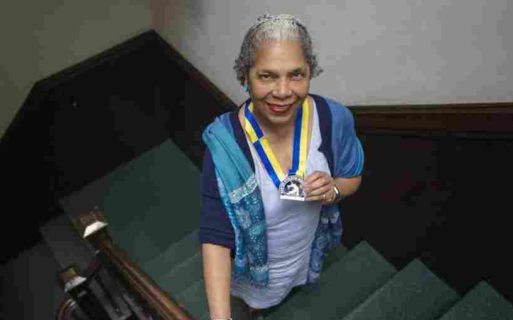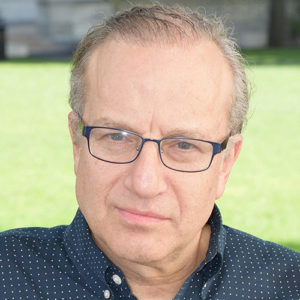As every oncologist will tell you, cancer is an unpredictable disease. Despite rigorous research protocols that map out every aspect of each patient’s treatment, some people with a particular diagnosis do well, while others succumb to their disease in a relatively short period of time. And while researchers are beginning to understand why this is the case, much of the disparity in outcomes is still a mystery.

Carol Martin holds her Boston Marathon medal
Credit: npr.org via Facebook
And then there are patients like Carol Martin, who was diagnosed with advanced pancreatic cancer two years ago in June. By all rights, Martin should have died within a few months of her diagnosis, but she is still very much alive. She has even returned to work at her job as a Harvard research administrator and — amid a raging Nor’easter that forced many top contenders to drop out — finished the Boston Marathon in April of this year.
Martin is one of what doctors are calling Enigmatic Exceptional Responders — a handful of extreme outliers who outlive doctors’ predictions for their survival not by weeks or months, but by years. No one, including their physicians, knows why this is the case. But now a team of researchers based at Harvard is planning to find out.
The Network of Enigmatic Exceptional Responders
Led by Dr. Zak Kohane, co-founder of the project and chair of Harvard Medical School’s Department of Biomedical Informatics, the research team will use computers capable of crunching data from hundreds of disparate sources, looking for patterns that might explain why patients like Martin survive. Dubbed the Network of Enigmatic Exceptional Responders, the database will be a clearinghouse of sorts, where researchers can look at everything from patients’ DNA and their tumors’ DNA to lifestyle issues like diet, exercise habits, social networks and even ZIP codes in search of clues.
“We know there’s something there,” said Dr. Kohane.”There are theories around your genome. There are theories around how your immune system is reacting. Maybe it’s the way your environment reprogrammed your immune system. It could be your diet, your exercise pattern, it could be any combination thereof, or maybe which drugs you took before — it’s hard to know.”
So the researchers will look at everything in the hopes of isolating one or more factors that give these exceptional responders their amazing edge.
A Unique Program
Although the National Cancer Institute created a database of exceptional responders using tissue samples submitted by physicians in 2014, the Harvard Exceptional Responders Network is unique in that it is reaching out to patients directly to create a national database across all cancer types. Patients will control who has access to the data, and can share it with other researchers if they wish.

Dr. Zak Kohane, co-founder of the Network of Enigmatic Exceptional Responders
Credit: hisa.org
Which patients will be accepted into the program will vary, according to Dr. Kohane. “If it’s 10 years out from your breast cancer diagnosis, and you’re doing fine, thank God, you’re not that unusual,” he said. “If you’re 10 years out from a metastatic lung cancer, and you’re alive, you are a miracle. And so these statistics have to be done per cancer, per treatment.”
The initiative is also the first to invite pharmaceutical companies to share their data from clinical trials. One firm, the Japanese pharmaceutical company Takeda, whose oncology unit is based in Cambridge, has already signed on and donated $1 million to the cause. According to Sunita Badola, director of functional genomics at the firm, the company has many examples of patients who “have either stable disease for a really long time, or they are in almost complete remission.” But because these patients were outliers, most of the drugs they received never reached pharmacy shelves.
Now it’s time to look at these outliers again, says Eric Perakslis, a co-founder of the project and a former Takeda executive. “There’s some reason they got better. We may or may not be smart enough to figure it out, but we’re not going to know unless we look.”

 A Plan to Learn from Cancer’s Exceptional Responders
A Plan to Learn from Cancer’s Exceptional Responders



 How to Comfort A Dying Loved One
How to Comfort A Dying Loved One
 Our Annual Seven Holiday Gifts for Someone Who Is Grieving, 2024 Edition
Our Annual Seven Holiday Gifts for Someone Who Is Grieving, 2024 Edition














